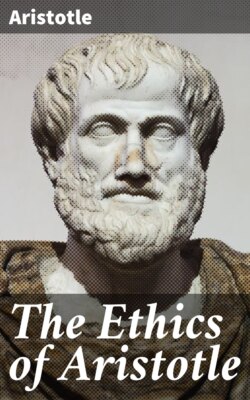Читать книгу The Ethics of Aristotle - Aristotle - Страница 17
На сайте Литреса книга снята с продажи.
IX
ОглавлениеNow that Moral Virtue is a mean state, and how it is so, and that it lies between two faulty states, one in the way of excess and another in the way of defect, and that it is so because it has an aptitude to aim at the mean both in feelings and actions, all this has been set forth fully and sufficiently.
And so it is hard to be good: for surely hard it is in each instance to find the mean, just as to find the mean point or centre of a circle is not what any man can do, but only he who knows how: just so to be angry, to give money, and be expensive, is what any man can do, and easy: but to do these to the right person, in due proportion, at the right time, with a right object, and in the right manner, this is not as before what any man can do, nor is it easy; and for this cause goodness is rare, and praiseworthy, and noble.
Therefore he who aims at the mean should make it his first care to keep away from that extreme which is more contrary than the other to the mean; just as Calypso in Homer advises Ulysses,
"Clear of this smoke and surge thy barque direct;"
because of the two extremes the one is always more, and the other less, erroneous; and, therefore, since to hit exactly on the mean is difficult, one must take the least of the evils as the safest plan; and this a man will be doing, if he follows this method.
[Sidenote: 1109b] We ought also to take into consideration our own natural bias; which varies in each man's case, and will be ascertained from the pleasure and pain arising in us. Furthermore, we should force ourselves off in the contrary direction, because we shall find ourselves in the mean after we have removed ourselves far from the wrong side, exactly as men do in straightening bent timber.
But in all cases we must guard most carefully against what is pleasant, and pleasure itself, because we are not impartial judges of it.
We ought to feel in fact towards pleasure as did the old counsellors towards Helen, and in all cases pronounce a similar sentence; for so by sending it away from us, we shall err the less.
Well, to speak very briefly, these are the precautions by adopting which we shall be best able to attain the mean.
Still, perhaps, after all it is a matter of difficulty, and specially in the particular instances: it is not easy, for instance, to determine exactly in what manner, with what persons, for what causes, and for what length of time, one ought to feel anger: for we ourselves sometimes praise those who are defective in this feeling, and we call them meek; at another, we term the hot-tempered manly and spirited.
Then, again, he who makes a small deflection from what is right, be it on the side of too much or too little, is not blamed, only he who makes a considerable one; for he cannot escape observation. But to what point or degree a man must err in order to incur blame, it is not easy to determine exactly in words: nor in fact any of those points which are matter of perception by the Moral Sense: such questions are matters of detail, and the decision of them rests with the Moral Sense.
At all events thus much is plain, that the mean state is in all things praiseworthy, and that practically we must deflect sometimes towards excess sometimes towards defect, because this will be the easiest method of hitting on the mean, that is, on what is right.
